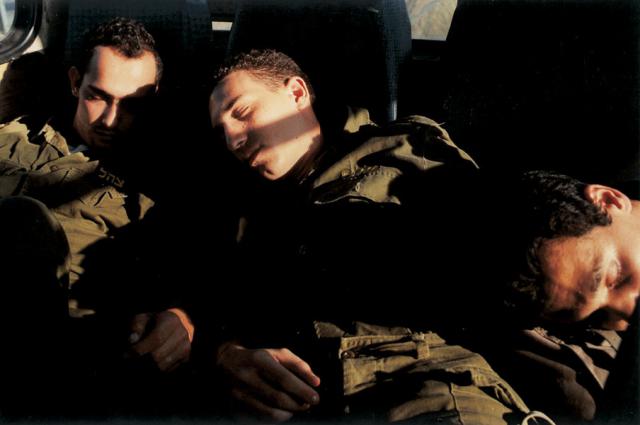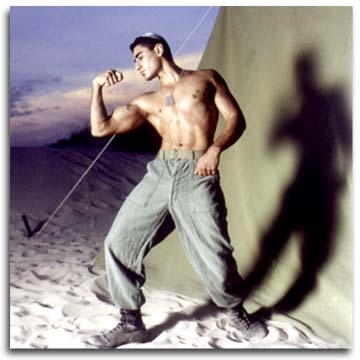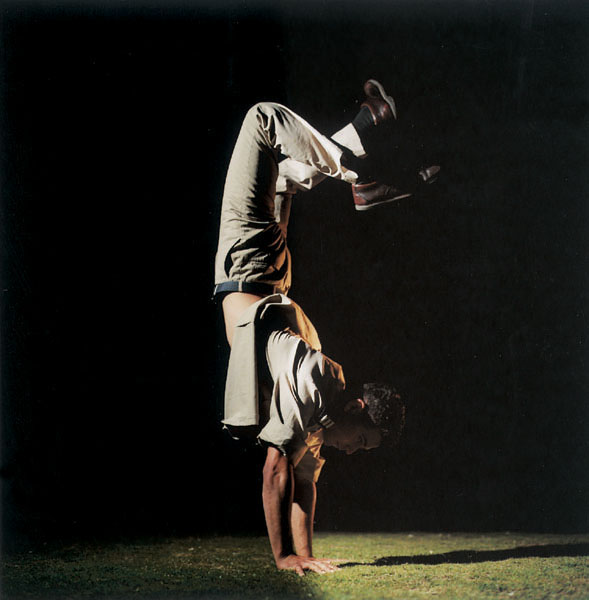Serendip is an independent site partnering with faculty at multiple colleges and universities around the world. Happy exploring!
Notes Towards Day 24 (Thurs, Apr. 12): Masculinity as Homophobia?

rayj's setting the stage: congratulations, you're a male feminist
I. Coursekeeping
for today, move into a different seat
alternate those with computers and those without
access this page so all can see....
and so that we can see, and listen to, one another....
for Tuesday, finish Jimmy Corrigan
a week from tomorrow, by 8 p.m. on Fri,
Apr. 20, your third 4-pp. web event is due
(do what I will do: look over your first two,
and my responses, and try to build from there...)
a week after that, Thurs, Apr. 26, will be our last class (!),
when I will expect you to have formed small groups
to prepare 10? minute presentations reflecting on your
experiences over the semester. Use the presentations to encourage,
in a provocative and entertaining way, further story development
on the part of others in the class.
(exs from those who have done this?
sekang, dchin, epeck's idea....?)
next Thursday (a week from today), I'll need you to tell
me what group you're in (so I can put together a playlist
and tell you how much time you'll have....)
II. last Tuesday (preparing for this collaborative work!)
we began crafting "mantrafestos"--
let's read them aloud, listen, and respond....
FrigginSushi, jdsisco, and amophrast:
"Working-class women already knew that the wages they received would not liberate them."
Liberation is difficult.
The fact that it's difficult means it's worth fighting for.
Palin was not fighting for liberation for working-class women.
Working-class people supported Palin because they found her relatable.
By relating to the average person, Palin earned hollow support.
If you knock on a hollow tree, it's very loud, but ultimately dead inside.
dear.abby, rayj and aybala50:
"feminist Politics is necessarily radical"
feminists Are made not born
Language is limiting
statements are oppressIve
just say No
pejordan, michelle.lee and MC:
"Feminists are made, not born."
Feminists are not made from sugar, spice and everything nice.
Feminists are made from a desire to dismantle the patriarchy.
Replacing men in traditional patriarchal roles with women cannot dismantle the patriarchy.
Class equality is necessary to dismantle the patriarchy.
Feminism is about more than women; it is about equality for all.
Feminist is not anti-feminine or anti-masculine.
To dismantle it, we must first recognize how we support the patriarchy and sever those connections where possible.
dchin, sekang, and Colleen:
"The voices of 'power feminism' tend to be highlighted in mass media."
Media rewards those who reinforce structures that are already in place.
Structures in place put Sara Palin in the McCain campaign.
The campaign exists within a structure that bell hooks wants to break free from.
Break free from reform, engage in revolution.
Revolution and presidential campaigns do not coincide (?)
cannot coexist (?)
one does not lend itself to the other (?).
S.Yeager, meowalex, buffalo:
"She cannot be anti-abortion and advocate for feminism"
Sarah Palin is anti-abortion.
Anti-abortion takes away the right to a safe body.
A safe body gives you agency.
hwink, mbeale, and sara.gladwin:
"Feminists are made, not born."
Making feminism is a revolutionary act.
Revolutions of mindset can be violent.
Violence is an upheaval to oppression.
What patterns do we see/hear here?
In what ways might these mantrafestos "appear" as feminist acts? (or not?)
In what way might "speaking directly from the unconscious" (i.e. "just filling out
the sentence w/ the first thing that comes to mind") be feminist --or not?
Is feminism about asking questions or making declarations?
What of the dangers of your education into endless questions...?
[recalling rayj's post about rape as the "undertheorized/
apparently untheorizable issue"--as it should be?!?]
Are there no politicians among us? "Should" there be?
A few further thoughts re: Sarah Palin, via bell hooks,
and our own political actions->
dear.abby: being an advocate of women, and women in politics, might
logically entail advocating against particular female politicians whose
politics work against the movement against sexist oppression.
JD: So for women's rights, how responsible for my life do I need to be?
MC: that every decision I make is impacted by the political environment I
move through ... makes me hyper-aware of what and how I consume and
speak, as well as the consumption of others. As a feminist ...is there any
decision I make that could be considered free of political thought?
other dimensions of bell hooks' polemic that you found useful? problematic?
"Feminism is for everybody...a movement to end ...oppression."
what about (everybody's favorite topic): love??!!
Early on the feminist critique of love was not complex enough…The heartbeat of
our alternative vision is that…there can be no love when there is domination….
A genuine feminist politics always brings us … to loving … mutual partnership….
there can be no love without justice. To choose feminist politics…is a choice to love.
III. Moving on to Masculinity!
Let's begin this topic by looking @ a couple of images
through the lenses provided by Kimmel's essay.
Write down the first three words that come to you as you look @ them.
Let's look @ each one only briefly, in order to encourage us not to
think about your answers, but let them arise "straight" from your unconscious…






What did you see?
What did you learn about yourself?
About your perceptions of masculinity?
About the perceptions of others in our group?
What are we learning, as a group, about varieties of perception?
What are we learning, as a group, about
the possibility of changing our perceptions?
All these images are early photographs by Adi Nes, who has said that the inspiration for his photography is partially autobiographical: “My staged photographs are oversized and often recall well-known scenes from Art History and Western Civilization combined with personal experiences based on my life as a gay youth growing up in a small town on the periphery of Israeli society.” Nes uses homoeroticism and sleeping, vulnerable figures to subvert the stereotype of the masculine Israeli man. I chose these images because I think they make masculinity—as I understand it, as it is generally understood in our society—ambiguous.
When I first started doing feminist scholarship, in graduate school @ Penn in the 1970s, it was called Women’s Studies; our goal was to try and bring the experiences of women into fields like biology and psychology and history and literature, where they had not been represented or studied. The first articles I published were all about giving attention to previously unnoticed work by 19th century American women.
But then we started to recognize that the gender systems that socialized women to behave in certain ways had been very damaging to men all around the world, too. A subfield of Men’s Studies emerged, and gradually programs like ours, which looked @ how people of all sorts came to be gendered, came to be called Gender Studies….
….the gender studies we're doing today focuses on the formation of men. We’re thinking, talking and spending some time being silent about the ways in which boys are shaped into men. How they are taught to be in the world. Whether we like those ways of being. And whether they might be changed. And how.
Cf. The American Prospect essay about
the men of your generation "rejecting toxic masculinity"--
"But what are these young men saying yes too?
We've all failed to envision an alternative....
it's dangerous that they don't have a clear picture
of what they want to build in its place."
IV. Let's start (again, a third time!) by listening to some
passages from Michael Kimmel's "Masculinity as Homophobia"
(which reminded sara.gladwin of Modern Family)
“just let two of the guys get together an’ you won’t talk…You’re all scared of each other, that’s what. Evr’one of you’s scared the rest is goin’ to get something on you” (Curley’s wife, speaking in John Steinbeck’s 1937 novel, Of Mice and Men).
“…the structure at the bottom of the male psyche is still as firm as it was twenty thousand years ago” (Robert Bly, Iron John: A Book About Men, 1990).
In 1882, “Senator Henry Clay had called the United States ‘a nation of self-made men.’ What does it mean to be ‘self-made’? What are the consequences of self-making for the individual man, for other men, for women?"
More from Kimmel:
Masculinity must be proved, and no sooner is it proved than it is again questioned and must be proved
again—constant, relentless, unachievable….”
The hegemonic definition of manhood is a man in power, a man with power, and a man of power. We equate manhood with being strong, successful, capable, reliable, in control…..Our culture’s definition of masculinity is thus several stories at once. It is about the individual man’s quest to accumulate those cultural symbols that denote manhood, signs that he has in fact achieved it. It is about those standards being used against women to prevent their inclusion in public life and their consignment to a devalued private sphere. It is about the differential access that different types of men have to those cultural resources that confer manhood and about how each of these groups then develop their own modifications to preserve and claim their manhood. It is about the power of these definitions themselves to serve to maintian the real-life power that men have over women and that some men have over other men.
Quoting Robert Brannon's
“The male sex role—and what it’s done for us lately” (1976):
1. “No Sissy Stuff!”
2. “Be a Big Wheel.”
3. “Be a Sturdy Oak.”
4. “Give ‘em Hell.”
American masculinity is a relentless test. The chief test is…”not being like women”….Historically and developmentally, masculinity has been defined as…the repudiation of femininity.
We are under the constant careful scrutiny of other men. Other men watch us, rank us, grant our acceptance into the realm of manhood. Manhood is demonstrated for other men’s approval. It is other men who evaluate the performance….Masculinity is a homosocial enactment. We test ourselves, perform heroic feats, take enormous risks, all because we want other men to grant us our manhood.
If masculinity is a homosocial enactment, its overriding emotion is fear…..”The lives of most American men are bounded…by the constant necessity to prove to their fellows, and to themselves, that they are not sissies, not homosexuals.”
“The tradition of all the dead generations weighs like a nightmare on the brain of the living”
(Karl Marx, 1848).
“The birthright of every American male is a chronic sense of personal inadequacy”
(Woolfolk & Richardson, 1978).
The nightmare from which we never seem to awaken is that those other men will see…that in our own eyes we are not who we are pretending to be. What we call masculinity is often a hedge against being revealed as a fraud…Our real fear “is…being ashamed or humiliated in front of other men.”…this, then, is the great secret of American manhood: We are afraid of other men. Homophobia is a central organizing principle of our cultural definition of manhood….the fear that other men will unmask us, emasculate us, reveal to us and to the world that we do not measure up, that we are not real men….Our fear is the fear of humiliation. We are ashamed to be afraid.
….the single most evident marker of manhood…is the willingness to fight.
….our peers are a kind of gender police….As young men we are constantly riding those gender boundaries, checking the fences we have constructed on the perimeter, making sure that nothing even remotely feminine might show through.
Men commit suicide three times as often as women….“invariably because of perceived social humiliation”…In one survey, women and men were asked what they were most afraid of. Women…were most afraid of being raped and murdered. Men...were most afraid of being laughed at.
Homophobia is intimately interwoven with both sexism and racism. The fear—sometimes conscious, sometimes not--that others might perceive us as homosexual propels men to enact all manner of exaggerated masculine behaviors and attitudes to make sure that no one could possibly get the wrong idea….Masculinity becomes a defense against the perceived threat of humiliation in the eyes of other men, enacted through a “sequence of postures”….the reigning definition of masculinity is a defensive effort to prevent being emasculated…..This perspective may help clarify a paradox in men’s lives, a paradox in which men have virtually all the power and yet do not feel powerful.
Men’s feelings…come inevitably from the discontinuity between the social and the psychological, between the aggregate analysis that reveals how men are in power as a group and the psychological fact that they do not feel powerful as individuals.
…the purveyors of the mythopoetic men’s movement…use the image of the chauffeur to describe modern man’s position….to the observer, the chauffeur looks as though he is in command. But to the chauffeur himself…he is merely taking orders. He is not at all in charge….But there is a missing piece to the image…the person who is giving the orders is also a man…we have a relationship between men….men’s experience of powerlessness is real—the men actually feel it and certainly act on it--but it is not true, that is, it does not accurately describe their condition….this contradictory experience of social and individual power.
For Tuesday, finish Chris Ware's graphic novel, Jimmy Corrigan,
which re-writes the script of superman. We'll think some more
together about masculinity, a category that is as complicated,
inflected, constructed, co-constructed and as potentially damaging
as femininity...
We'll look at a "little man," a failed super-hero,
asking what we can do with that category,
and what we can learn from it...


